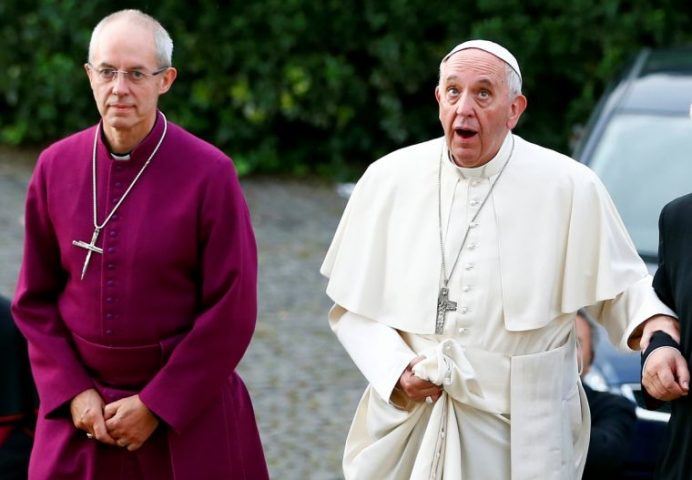When I was a minister in the Church of England I got used to the divisions in the church. They were not called “divisions” of course, they were called “diversity” – but that is typical of Anglicans. They are so adept at double talk, polite obfuscation, Fozzy Bear theology and downright self delusion.
“We’re Catholics.” they love to smile patronizingly over their glass of sherry, “just not Roman Catholics….” What I can’t communicate in print is the arch, snobbish manner in which they say “Roman” but it has all the ice and condescension of the Anglican vicar who says, “The Catholic Church is all well and good…for Italian waiters and Irish navvies.”
You got used to both the Anglo-Catholics and the Evangelicals, who had completely diametrically opposed understandings about virtually everything in the Church, but who somehow managed to say on board the same ship.
The Anglo Catholics are the ones who interest me most because they aped the Catholics, often bragging that they were “More Catholic than the Catholics” which meant their surplices had more lace, their thuribles had more incense and their stained glass accents were richer than the low class Catholics.
The Anglo Catholic movement, at its best had much to recommend it. Despite their penchant for chasubles and china tea cups, their best men did great work in the slums of England and there was a great spiritual fervor in their worship and devotions. The movement is pretty well dead and gone now that the new Bishop of London is a woman. London used to be one of their strongholds and now the remaining Anglo Catholics are either hunkering down or heading for Blackburn or Chichester.
What interests me more than the sad state of the Anglo Catholic movement is a new movement in the Catholic church which might be called not Anglo Catholics, but Catholic Anglicans.
These are the clergy and academics in our own church who think and act like Anglicans. As the Anglo Catholics used to chortle, “We’re more Catholic than the Catholics” the breed of Catholics I’m referring to might as well boast, “We’re more Anglican than the Anglicans.”
I am referring, of course to people like Fr James Martin SJ who, with his gay advocacy can match the Anglican gay activists easily. Peter Tatchell meet Fr Jim. Then there are the Catholic proponents of women’s ordination who are so gun ho that they put the Anglican ladies in the shade. Likewise, those who argue that “in certain circumstances” divorced and remarried people may receive communion are certainly kneeling at the same altar as the Anglicans.
In this excellent article Edward Pentin points out that a recent statement by one of the newly appointed members of the Academy for Life argues that chapter eight of Amoris Letitia (which is where we find the ambiguous statement about divorced and remarried receiving communion) also opens the door to the use of artificial contraception in some circumstances.
Pentin points out that critics say this is precisely the way Anglicans argued in their famous 1930 acceptance of artificial contraception.
Dominican Father Ezra Sullivan, professor of moral theology at the Pontifical University of St. Thomas Aquinas in Rome, and others have noted similarities in this debate with the Lambeth Conference of 1930, when Anglican bishops passed Resolution 15 to allow contraceptive use only on clear “moral” grounds but not for “motives of selfishness, luxury, or mere convenience.” The resolution stated:
“Where there is a clearly felt moral obligation to limit or avoid parenthood, the method must be decided on Christian principles. The primary and obvious method is complete abstinence from intercourse (as far as may be necessary) in a life of discipleship and self-control lived in the power of the Holy Spirit. Nevertheless, in those cases where there is such a clearly felt moral obligation to limit or avoid parenthood, and where there is a morally sound reason for avoiding complete abstinence, the Conference agrees that other methods may be used, provided that this is done in the light of the same Christian principles. The Conference records its strong condemnation of the use of any methods of conception-control for motives of selfishness, luxury, or mere convenience.”
Father Sullivan, who said the thinking of Father Chiodi and others “is in line” with the Anglicans’ resolution, pointed out that the Anglican bishops at that time “famously declared that married couples may use contraceptives, albeit only when they ‘clearly felt’ it was a ‘moral obligation.’” Couples, he added, “were to avoid all ‘motives of selfishness, luxury, or mere convenience,’ of course.”







